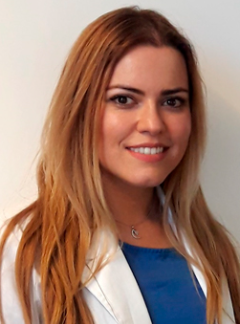
Abstract: P921
Type: Poster Sessions
Abstract Category: Therapy - Long-term treatment monitoring
Introduction: In 2011, fingolimod was approved in Chile for the treatment of multiple sclerosis (MS). Results of effectiveness and safety in real-world patients are necessary, with an underrepresentation of latin american cohorts in previous studies.
Objective: To describe real-world performance of fingolimod in MS patients with a long term follow-up.
Methods: This prospective longitudinal observational data collection study was performed at the Programa de Esclerosis Múltiple UC and Unidad de Esclerosis Múltiple y Neuroinmunología Hospital Dr. Sótero del Río in Chile from July 2011 to May 2018. Demographic and clinical data from 177 consenting patients who had received treatment with fingolimod were analysed.
Results: We included 121 women, 56 men, 170 relapsing-remitting, 7 active secondary progressive MS, mean age at onset 28.7+8.7 years, median baseline EDSS 2.0 (range 0-7.5), mean baseline annualized relapse rate (ARR) 0.93+0.9, mean age and disease duration at fingolimod start of 35.7+10.1 and 10.3+6.4 years, respectively. Indications for fingolimod were de-novo/naïve 8% (aggressive MS, bad prognosis factors), second line 67% (failure to 1° line treatment), adverse events 23%, others 3%. Seventy-three percent of patients remain using fingolimod with a mean treatment duration of 27.3+20.3 months. Under fingolimod, 71% of patients remained free from relapses and 60% remained without new MRI lesions. Mean ARR during treatment was 0.23+0.5 at 12 months (n:123, 70%), 0.20+0.7 at 24 months (n: 90; 51%), and 0.17+0.5 at 36 months (n:71; 40%). Reasons from the 47 patients who stopped treatment at the end of follow-up were: 28 (60%) treatment failure, 10 (21%) adverse events, 8 (17%) pregnancy, 1 (2%) death not related to fingolimod. No patients were lost to follow-up.
Conclusions: In this latin american Chilean MS cohort, over 60% of patients under fingolimod treatment showed freedom from relapses and no new MRI lesions, and sustained with low annualized relapse rates. In addition, treatment retention rate over 24 and 36 months was high, with a small proportion of patients stopping fingolimod due to treatment failure or adverse events.
Disclosure: EC have received educational grants from the ECTRIMS Clinical Training Fellowship Programme 2013-2014. Have served as an advisory board member for Genzyme, Biogen and Merck. Have received professional travel and accommodation stipends from Novartis, Biogen, Genzyme, Teva and Merck.
EV nothing to disclose
RU nothing to disclose
JCC nothing to disclose
CC Have served as an advisory board member for Genzyme, Biogen and Merck. Have received professional travel and accommodation stipends from Novartis, Biogen, Genzyme, Teva and Merck.
Abstract: P921
Type: Poster Sessions
Abstract Category: Therapy - Long-term treatment monitoring
Introduction: In 2011, fingolimod was approved in Chile for the treatment of multiple sclerosis (MS). Results of effectiveness and safety in real-world patients are necessary, with an underrepresentation of latin american cohorts in previous studies.
Objective: To describe real-world performance of fingolimod in MS patients with a long term follow-up.
Methods: This prospective longitudinal observational data collection study was performed at the Programa de Esclerosis Múltiple UC and Unidad de Esclerosis Múltiple y Neuroinmunología Hospital Dr. Sótero del Río in Chile from July 2011 to May 2018. Demographic and clinical data from 177 consenting patients who had received treatment with fingolimod were analysed.
Results: We included 121 women, 56 men, 170 relapsing-remitting, 7 active secondary progressive MS, mean age at onset 28.7+8.7 years, median baseline EDSS 2.0 (range 0-7.5), mean baseline annualized relapse rate (ARR) 0.93+0.9, mean age and disease duration at fingolimod start of 35.7+10.1 and 10.3+6.4 years, respectively. Indications for fingolimod were de-novo/naïve 8% (aggressive MS, bad prognosis factors), second line 67% (failure to 1° line treatment), adverse events 23%, others 3%. Seventy-three percent of patients remain using fingolimod with a mean treatment duration of 27.3+20.3 months. Under fingolimod, 71% of patients remained free from relapses and 60% remained without new MRI lesions. Mean ARR during treatment was 0.23+0.5 at 12 months (n:123, 70%), 0.20+0.7 at 24 months (n: 90; 51%), and 0.17+0.5 at 36 months (n:71; 40%). Reasons from the 47 patients who stopped treatment at the end of follow-up were: 28 (60%) treatment failure, 10 (21%) adverse events, 8 (17%) pregnancy, 1 (2%) death not related to fingolimod. No patients were lost to follow-up.
Conclusions: In this latin american Chilean MS cohort, over 60% of patients under fingolimod treatment showed freedom from relapses and no new MRI lesions, and sustained with low annualized relapse rates. In addition, treatment retention rate over 24 and 36 months was high, with a small proportion of patients stopping fingolimod due to treatment failure or adverse events.
Disclosure: EC have received educational grants from the ECTRIMS Clinical Training Fellowship Programme 2013-2014. Have served as an advisory board member for Genzyme, Biogen and Merck. Have received professional travel and accommodation stipends from Novartis, Biogen, Genzyme, Teva and Merck.
EV nothing to disclose
RU nothing to disclose
JCC nothing to disclose
CC Have served as an advisory board member for Genzyme, Biogen and Merck. Have received professional travel and accommodation stipends from Novartis, Biogen, Genzyme, Teva and Merck.


